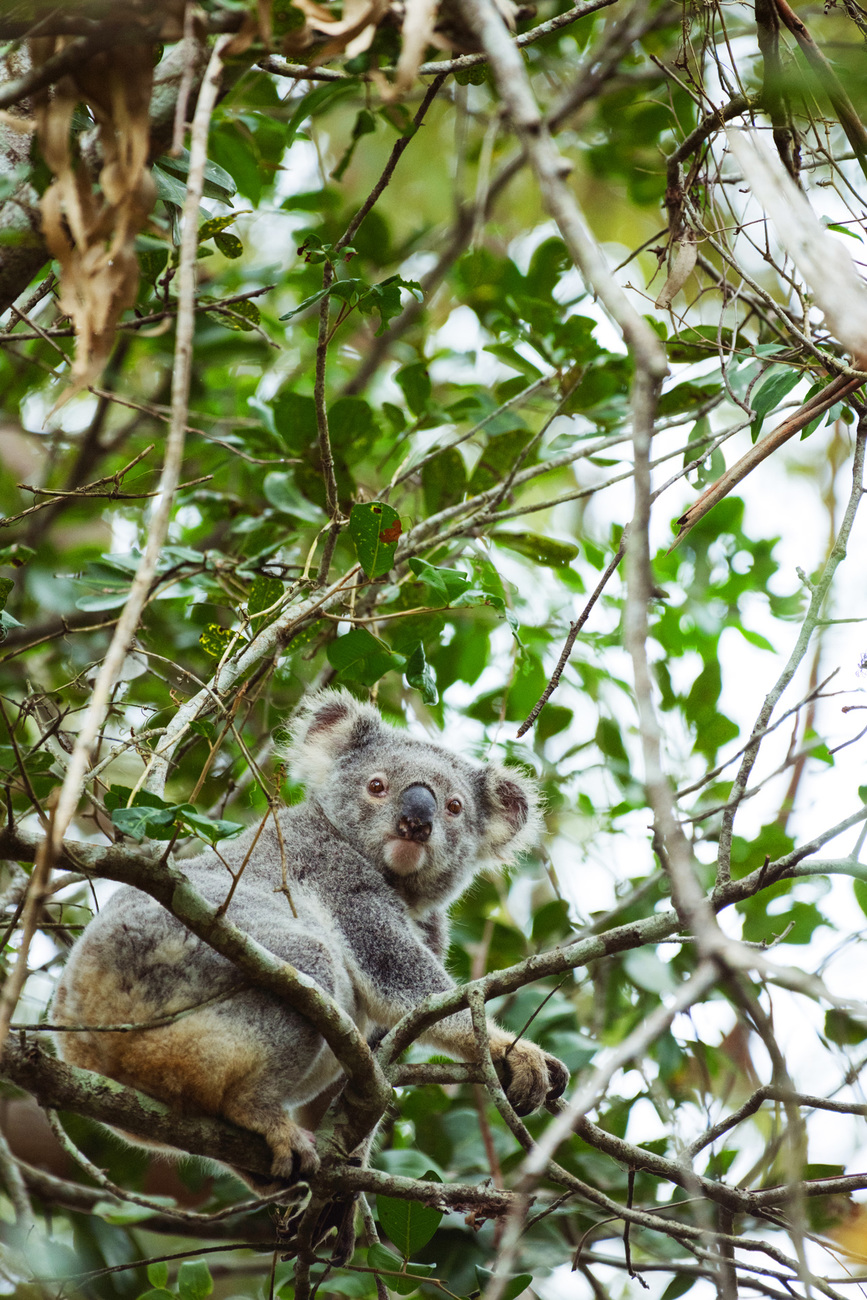Koala Protection: Rescue, Rehabilitate, Release, and Secure - Australia, New South Wales
Planting a future for koalas, one tree at a timeA mission to rescue sick koalas in northern New South Wales
A mission to rescue sick koalas in northern New South Wales

A tree climber and koala detection dog have joined forces with a specialised vet team to rescue sick koalas.
The International Fund for Animal Welfare (IFAW) was alerted to a dozen koalas that were believed to be sick in the New South Wales Northern Rivers region. Local koala rescuer and carer Maria Matthes had been keeping an eye on the koalas, but was unable to access them because of the difficult terrain and vegetation.
IFAW deployed responder and tree climber Kailas Wild and the University of Sunshine Coast (USC) x IFAW koala detection dog Bear to help find and catch the koalas.
“We were concerned about the welfare of these koalas, so being able to access them was our priority. Bear with his highly developed sense of smell helps us find the koalas quickly while Kailas with his tree climbing skills helps us bring the koalas down safely so our carers and rescuers can catch and assess them, and provide treatment if needed,” IFAW Animal Rescue Officer Nicole Rojas-Marin said.
IFAW-sponsored vet nurse at Friends of the Koala Marley Christian joined to help assess the koalas with Maria. The team, which also included Friends of the Koala volunteers, spent three days in Ballina and Lismore in July and found 15 koalas including one joey.
“Koalas are difficult to catch ordinarily but add in steep terrain and thick vegetation and it’s that much harder. Having Bear and Kailas on the team was crucial in ensuring sick koalas are rescued as quickly and safely as possible,” Ms Christian said.
At least five koalas needed further assessment or treatment but the challenging terrain and position of the koalas, made it dangerous for them to be captured. One male koala suffering chlamydial cystitis was captured. The koala, named Kong, was taken to Friends of the Koala.
“The rescue of this one koala is hugely important for the species because each individual is crucial to the conservation of their population. By removing him from the area, we’re preventing him from spreading his illness to other healthy koalas. To properly help sick koalas, we need specialised vets and vet nurses – which is why IFAW is so proud to be supporting the vet team at Friends of the Koala,” Ms Rojas-Marin said.
Kailas, who is a climbing arborist by trade, made national headlines when he drove 1500 kilometres to Kangaroo Island in the middle of the Black Summer bushfires to help koalas
that could only be accessed by a tree climber. When he heard there could be koalas in need of care in the Ballina region, he knew his skills could be of use again.
“So much of our wildlife are arboreal, particularly koalas, so it’s essential to be able to access them by climbing trees. It can be the difference between being able to help them and not. It was pretty amazing to be involved in an operation with a detection dog where I can go straight up a tree that Bear indicated has a koala in it. The efficiency that’s gained through that teamwork is huge,” he said.
USC Detection Dogs for Conservation co-founder Dr Romane Cristescu said in many places where populations are dwindling, koalas need direct actions.
“This sort of mission is a great example of how we can achieve immediate impact: both for the welfare of each suffering koala, but also for the population as a whole. Each koala treated now is a chance for more joeys in the future, and ultimately, this is how we ensure a population increase,” Dr Cristescu said.
"This is what inspires us to keep going, even in the face of sometimes overwhelming situations, where we feel there are so many threats, in so many places, that need addressing. But seeing all these groups come together to help a koala population in need, this is when we know there's hope."
Sadly, Kong’s cystitis was very severe and despite the efforts of the IFAW-sponsored vet team at Friends of the Koala, he had to be euthanised.
“It’s a sad outcome for Kong but by rescuing him, we saved him from a slow and painful death in the wild,” Ms Matthes said.
“The difference working in a team like this is huge and is the least we can do for our koalas. We are looking forward to repeating this exercise to capture these elusive koalas in need of care.”
ENDS
Photos and video available here.
Press contact:
Dominica Mack, IFAW
dmack@ifaw.org
0460 432 901
About the International Fund for Animal Welfare - IFAW is a global non-profit helping animal and people thrive together. We are experts and everyday people, working across seas, oceans and in more than 40 countries around the world. We rescue, rehabilitate and release animals, and we restore and protect their natural habitats. We partner with local communities, governments, non-governmental organisations and businesses. Together, we pioneer new and innovative ways to help all species flourish. See how at ifaw.org
Related content
Every problem has a solution, every solution needs support.
The problems we face are urgent, complicated, and resistant to change. Real solutions demand creativity, hard work and involvement from people like you.